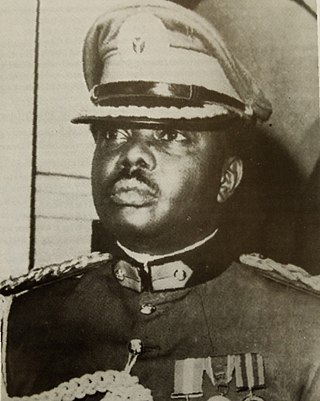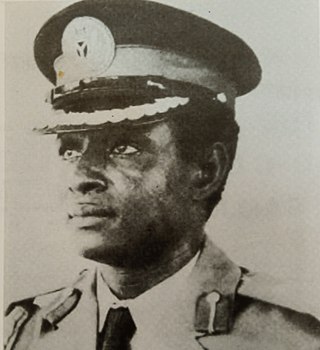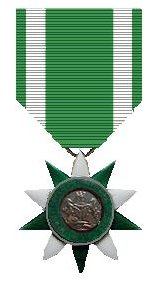Related Research Articles

Murtala Ramat Muhammed ; 8 November 1938 – 13 February 1976) was a Nigerian general who led the 1966 Nigerian counter-coup in overthrowing the Johnson Aguiyi-Ironsi military regime and featured prominently during the Nigerian Civil War and thereafter ruled over Nigeria from 29 July 1975 until his assassination on 13 February 1976. This period in Nigerian history, from the Northern counter-coup victory to Murtala's death, is commonly associated with the institutionalization of the military in politics.

The president of the Federal Republic of Nigeria is the head of state and head of government of the Federal Republic of Nigeria. The president directs the executive branch of the federal government and is the commander-in-chief of the Nigerian Armed Forces.

Shehu Musa Yar'Adua ; 5 March 1943 – 8 December 1997) was a Nigerian general and politician who was the de facto vice president of Nigeria as Chief of Staff, Supreme Headquarters when Nigeria was under military rule from 1976 to 1979. He was a prominent politician during the later transition from military to civilian rule in the late 1980s and into the 1990s.
Lieutenant Colonel Bukar Suwa Dimka was a Nigerian military officer who played a leading role in the 13 February 1976 abortive military coup against the government of General Murtala Ramat Muhammed. Dimka also participated in the Nigerian counter-coup of 1966 which toppled the government of General Aguiyi Ironsi.

The military dictatorship in Nigeria was a period when members of the Nigerian Armed Forces held power in Nigeria from 1966 to 1999 with an interregnum from 1979 to 1983. The military was able to rise to power often with the tacit support of the elite through coup d'états. Since the country became a republic in 1963, there has been a series of military coups in Nigeria.

Bukar Shaib was a Nigerian diplomat, who served as the Nigerian Ambassador to Italy from 1979. He also served as a minister for agriculture in the administration of General Buhari. He was born in Borno State, and studied Veterinary medicine at the collegiate level, becoming the first Nigerian Veterinary Doctor. He was a former federal and regional permanent secretary during the Gowon, then Murtala and Obasanjo regimes. He was appointed as special adviser on National Security to President Shehu Shagari. After Shagari's overthrow he was appointed by the new administration as the minister for Agriculture.

The Independent National Electoral Commission (INEC) is the electoral body which oversees elections in Nigeria. It was established in 1998 shortly before Nigeria's transition from military to civilian rule.
Dodan Barracks is a military barracks located in Ikoyi, Lagos, Nigeria. The barrack was the Supreme Military Headquarters during the Nigerian Civil War and from 1966 to 1979 and 1983 to 1985. Dodan Barracks was the official residence of the military heads of state of the Nigerian military juntas of 1966–79 and 1983–99, and also the Supreme Military Headquarters from 1966 until the move to Abuja in 1991.
Ibrahim Taiwo was a Military Governor of Kwara State from July 1975 to February 1976 during the military regime of General Murtala Mohammed. He assisted in establishment of the University of Ilorin, which was founded by decree August, 1975.
Paul Ufuoma Omu was Military Governor of South-Eastern State, Nigeria between July 1975 and July 1978 during the military regimes of Generals Murtala Muhammed and Olusegun Obasanjo.
Colonel Anthony Aboki Ochefu was a Military Governor of East Central State from July 1975 to February 1976 during the military regime of General Murtala Mohammed.
Abdullahi Mohammed is a retired Nigerian Army major general, who served as chief of staff to presidents Olusegun Obasanjo and Umaru Musa Yar'Adua from 1999 to 2008; National Security Adviser to General Abdusalami Abubakar from 1998 to 1999; Director General of the National Security Organization from 1976 to 1979; and Governor of Benue-Plateau State, Nigeria from July 1975 to February 1976 during the military regime of General Murtala Mohammed.

The Supreme Military Council was the body that ruled Nigeria after the 1966 coup d'état until it was dissolved following the 1979 parliamentary election and the Second Nigerian Republic. The Supreme Military Council was located at Dodan Barracks as the Supreme Military Headquartered (SMHQ) in Lagos.

The Order of the Federal Republic (OFR) is one of two orders of merit, established by the Federal Republic of Nigeria in 1963. It is senior to the Order of the Niger.
Alfred Aduloju was a Nigerian Army major general who served as commanding officer of a number of Nigerian Army divisions and Commandant of the Nigerian Armed Forces Command and Staff College. He was also one of the principal actors in the 29 July 1975 coup that ousted then military head of state, General Yakubu Gowon.
The second inauguration of Goodluck Jonathan as the 14th president of Nigeria, and 3rd in the fourth republic was held on Sunday, 29 May 2011, marking the start of the second and only full term of Goodluck Jonathan as president and Namadi Sambo as vice president. It was the 6th presidential inauguration in Nigeria, and 4th in the fourth republic.
The inauguration of Umaru Musa Yar'Adua as the 13th president of Nigeria, and 2nd in the fourth republic was held on Tuesday, 29 May 2007, marking the commencement of Umaru Musa Yar'Adua's and Goodluck Jonathan's only term as president and vice president. It was the 5th presidential inauguration in Nigeria, the 3rd in the fourth republic and the first successful transition of power, from one democratically elected leader to another in Nigeria. Yar'Adua died 2 years, 341 days into this term, and Jonathan succeeded to the presidency.
References
- ↑ "I felt petrified when I emerged Head of State – Gowon". The Guardian . Retrieved 2 October 2020.
- ↑ "Nigeria's President Buhari promises change at inauguration". BBC News. Retrieved 29 May 2015.
- ↑ "Historic succession complete as Buhari is sworn in as the president of Nigeria". The Guardian . Retrieved 29 May 2015.
- ↑ "50 Interesting Facts about Murtala Muhammed". HistoryVille. Retrieved 13 February 2019.
- ↑ "Historic succession complete as Buhari is sworn in as the president of Nigeria". The Guardian . Retrieved 29 May 2015.
- ↑ "Ex-President Shehu Shagari dies at 93". Punch News. Retrieved 28 December 2018.
- ↑ "Shehu Shagari, Nigerian President During '80s Oil Crisis, Dies at 93". The New York Times. Retrieved 28 December 2018.